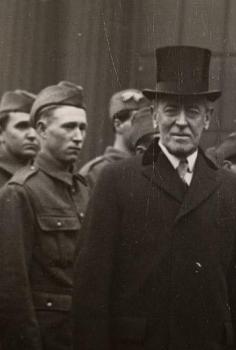“God is with us and we with him!”
During the Great War, this phrase – “Gott mit uns” – was the rallying cry of the German military. Featured on military gear like belt buckles, displayed in town centers, printed on stationary postcards like the one shown here and inspiring countless war poems and songs, it reflected deeply-held beliefs by German leadership and the hopes of the German people.
A New Empire
At the start of World War I in 1914, the German Empire was a relatively new country in Europe – born in 1871 after a successful Prussian conflict with France united 39 separate Germanic states.
Prussia was the biggest state in the German Empire, with a deep military culture and devout Protestant beliefs. Bavaria was the next largest state in the German Empire, with a more rural and Catholic citizen majority. Although residents were politically loyal to the German Empire, about 70 percent of Bavarians gave their religious support to the Pope. During the pre-war period there was also a successful push for society to recognize the full citizenship of German Jewish citizens. This movement led to the growth of German acknowledgement of Jewish contributions to the German identity.
Religious differences between neighbors, however, created uneasy relationships in the years leading up to World War I.
A United Empire
Leaders of the German Empire hoped that World War I’s conflict would eliminate perceived religious divisions and provide both political and religious unity. After the start of fighting in the summer of 1914, Kaiser Wilhlem II declared: “Ich kenne keine Parteien mehr, ich kenne nur noch Deutsche!” (“I know no more parties, I know only Germans!”) Patriotic fever ran high in Germany and cut across faiths.
The phrase “Gott mit uns” became the unifying cry of Germany, displayed on all belt buckles in the German Infantry and echoed by civilians across the country. Jewish-German poet and dramatist Ernst Lissauer penned the popular slogan “Gott strafe England” (“God punish England”) and its extension, “Hassgesang gegen England” (“Hymn of Hate for England”). For religiously diverse citizens in the newly-formed empire, supporting the Prussian belief that God had ordained the German Empire to be above all others was a chance to show loyalty to – and find belonging in – the state.

As this postcard shows, the unifying belief that God was working through the German Empire transferred to the empire’s allies: Austria-Hungary, Bulgaria and the Ottoman Empire. The postcard displays the German flag, a dual shield with half of the German black eagle crest and half of the Austro-Hungarian crest, and crests for the Ottoman Empire and Bulgaria in the top corners. Printed in the center, the phrase “Gott mit uns and wir mit ihm!” (“God is with us and we with him!”) declares that by uniting with Germany, these countries were now also ordained for God’s righteous cause.
Weaponizing Religion
German leaders didn’t stop at propagandizing Christianity in their efforts to win hearts and minds over to their cause. The alliance with the Ottoman Empire brought opportunities to weaponize Islam as well.
Find out more in the digital exhibition “Fighting with Faith”








